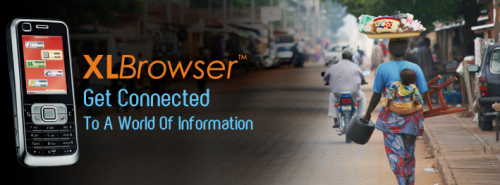In the summer of 2008, US-based Mobile-XL launched their new SMS browser in Kenya. I had been in touch with their CEO Guy Kamgaing-Kouam, via email, but we had never had always just missed each other in Kenya or in the US. Since then, I’ve been watching them closely, and seeing how their business unfolds as they target African nations with their new service. They are starting with Kenya, Uganda and Tanzania, but are aiming to roll out in South Africa, Cameroon and Nigeria soon.
Big, Strong Moves
It seems that Mobile-XL is doing well. In July, they partnered with Fonexpress, a Kenyan retail chain of ICT products and services to provide content and services. In November, they announced that mobile pioneer Alieu Conteh, Chairman of Vodacom Congo, has agreed to join the Board of Advisors.
Today, they have announced their biggest news, a collaboration with Nokia to start embedding its SMS based browser in mobile phones for selected African markets. This, of course, is the big prize for any mobile application developer: the chance to have your application bundled with the base-level software available out-of-the-box.
“As early as March 2009, a select series of Nokia handsets shipping into Kenya, Uganda and Tanzania will be equipped with the firms XLBrowser software service.”
The XLBrowser, and why it matters
Guy, and his team at Mobile-XL, have built the XLBrowser. This is a J2ME (Java) application that utilizes SMS to provide instant access to global and local information using almost any mobile phone. The XLBrowser’s interface allows users to select and instantly receive information, news, sports, finance, entertainment, games, music, and more. Costs appear to be slightly more expensive than a basic SMS message (10/= shillings in Kenya).
Though the XLBrowser is a walled garden (content-wise), it is still particularly innovative as they use SMS to send data. This type of technology is perfect for places in rural Africa where WAP, GPRS and internet connections are limited at best. This is the beginnings of something very interesting.
Many make claims to “bridging the digital divide”, as do the people at Mobile-XL. But, in this case I think they’re right. It’s not just another application that relies on strong mobile data connections, but one that can work off the very lowest common denominator – which is what is needed in much of Africa today.
Their next big trick will be to bring on as many new subscribers as possible, and that only happens when there is real value added through the use of the application. With strong content offerings, ones that people in Africa truly care about, they could very well pull this off.
Personally, I’d love to see more businesses take on this challenge. Using SMS to connect Africans to the rest of the web, and the world.
